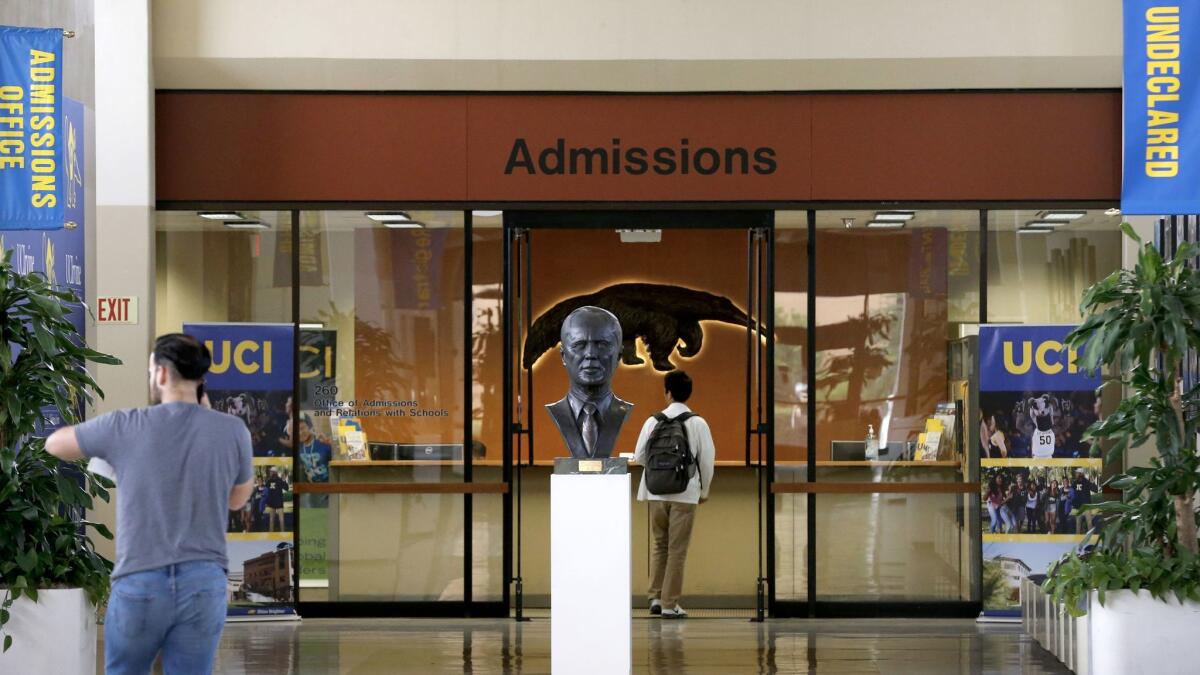UC regents to examine UC Irvine’s rescission fiasco, impact of another possible tuition increase

- Share via
University of California regents, meeting this week in San Diego, will take a good look at campus policies for rescinding admission offers, prompted by the recent debacle after UC Irvine abruptly canceled nearly 500 acceptances this summer.
The regents, meeting Wednesday and Thursday, also will discuss the preliminary budget for next year, including the impact of another potential tuition increase.
Earlier this year, regents approved the first tuition hike since 2010-11 — amounting to $282, or 2.5% — along with a $54 increase in the student services fee. Financial aid covered those increases for two-thirds of the university system’s roughly 175,500 California undergraduates — and only the wealthiest families would pay all of any new increase, according to a budget memo to the regents.
On the rescission front, UC Irvine Chancellor Howard Gillman is scheduled to report the preliminary findings of an internal audit looking at mistakes the campus made in withdrawing admission offers and actions to be taken to avoid similar errors. The full audit is expected by Sept. 30.
UCI’s rescissions stunned and outraged students. Many said their hard-earned admission offers were canceled for minor or bogus reasons — or for no reason at all. Gillman apologized for the fiasco, calling the stories of those suddenly rejected “heartbreaking and unacceptable,” and announced UCI would readmit all students who had maintained good senior-year grades but had their acceptances revoked because of alleged paperwork problems, such as missing deadlines to submit their transcripts.
Last year, more than 216,000 students applied to the UC system’s nine undergraduate campuses. Applicants self-report their grades, courses and test scores at the time, but the university requires those who choose to enroll to verify the information with transcripts by July.
The number of students who fail to provide that information and subsequently lose their seats varies by campus and year. Last year, for instance, UC Berkeley withdrew no offers from freshmen and transfer applicants because of missing documents or test scores while UC Riverside withdrew 445, according to a memo to the regents.
Campus officials are still verifying information for this year but as of Aug. 15, UC Davis and UC San Diego each had canceled about 200 admission offers due to missing paperwork. UCLA, UC Irvine, UC Riverside and UC Santa Barbara, meanwhile, had no rescissions, even though information was missing for hundreds of students.
On the budget front, the UC system could be left scrambling for more dollars next year if state funding continues to fail to keep pace with continued enrollment growth and campus needs.
According to the budget memo, UC campuses could receive $34 million less in state funding than expected if Gov. Jerry Brown reduces the annual increase to 3% from the 4% pledged through next year under a budget agreement with UC President Janet Napolitano. Brown’s May revise budget proposal said UC should plan for a 3% funding increase next year since its tuition hike this year caused the state to pay out more financial aid, reducing available general fund dollars.
Brown also has held back $50 million until UC makes more progress in such areas as increasing transfer students, completing a cost accounting pilot project, eliminating extra retirement perks for future top administrators and financial reforms in the Office of the President. The university also will need to find more money to cover growing pension costs and pay for the 1,500 additional California students expected to be enrolled next year.
UC officials have laid out scenarios surrounding a 2.5% tuition increase and a 5% hike in the student services fee. That $348 increase, along with a $662 inflationary rise in other student expenses — could bring the total cost of attendance from $34,700 this year to $35,710 next year.
But even with such an increase, UC officials say that about 100,000 students whose parents earn less than $100,000 would actually pay $100 less next year because they would receive more financial aid. Those whose parents make $140,000 would receive some aid from the state’s middle-class scholarship program and pay about $266 more. Only those students with family incomes of $165,000 and higher would pay the full $348 increase, the budget memo says.
The regents will not take action on any tuition increase this week but will approve a final budget plan at their November meeting.
More to Read
Sign up for Essential California
The most important California stories and recommendations in your inbox every morning.
You may occasionally receive promotional content from the Los Angeles Times.











